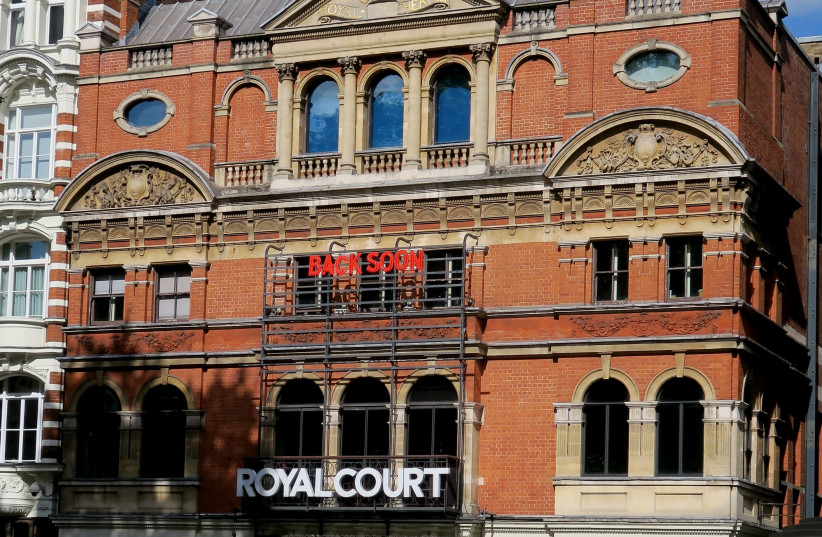There are few stranger experiences than watching yourself on stage. That happened to me when I recently went to see a play at the Royal Court Theatre about British Jews by the acclaimed journalist Jonathan Freedland, Jews. In Their Own Words. My review is, by definition, biased because I was a subject of the play and also beautifully portrayed by an actor.
The idea for the play came from discussions between the Royal Court and actress Tracy Ann Oberman, who has suffered antisemitic abuse. The idea was to hear what it is like for Jews to encounter antisemitism, listen to us in our words and not assume they know what we feel and think.
The production was in part the Royal Court Theatre’s way of making amends for several insensitive and offensive productions, including a decision to give a Jewish name (Hershel Fink) to the character of a corrupt, manipulative billionaire in a play, in 2021
Freedland, a columnist at The Guardian, Britain’s main Center-Left newspaper, interviewed 12 British Jews who were then portrayed by seven actors. He turned 180,000 recorded words into text, which is directed by Vicky Featherstone and Audrey Sheffield.

Our stage representatives spoke only our words, often as if they were interacting with each other even though no such interactions had ever happened and in most cases, we had never met.
Some of those portrayed are well-known to the British public, such as Howard Jacobson, a novelist and a journalist; Margaret Hodge, a member of parliament; and Luciana Berger, a woman hounded out of politics by antisemites. There was a social worker, a decorator and then me, an Iraqi Jew who arrived in Britain as a refugee.
Seeing myself portrayed on stage
Shuker was represented by the wonderful Turkish actor Hemi Yeroham. I felt immense pride at hearing him introduce himself as Edwin Shuker. He spoke in a way that closely resembled my accent and he used my exact words. Yeroham told me that he listened to the recording of my interview with Freedland more than 20 times so he could pick up the subtleties in my storytelling.
That story is not mine alone. It is the story of hundreds of thousands of Jews from Arab countries forced to flee their millennia-old homelands. Through a talented actor, I was able to speak of the suffering of Iraqi Jews and so many other communities. Pain that most of the audience and many British Jews were unaware of.
WE IRAQI Jews trace our history to the destruction of the First Temple in 586 BCE. The psalm “Al naharot Bavel” (“By the rivers of Babylon”) tells of our mourning for Zion Jerusalem when we became the first Jewish Diaspora community and in my view also the first Zionists.
Born in 1955, I grew up in what seemed to be a cosmopolitan Iraq, a place in which Sunni, Shia, Kurds, Arabs, Assyrian Christians, Yazidis, Mandeans, Jews and so many others lived together in harmony and respect.
Our Iraqi paradise, as we saw it, was overthrown in 1963 when the antisemitic Baath Party took power in a coup. Although soon ejected from power, the Baath returned with a vengeance in 1968 and again targeted Jews, depriving us of basic human rights, such as communicating freely, higher education, public sector work, freedom of movement and cruelly, the right to leave the country. Iraq became a prison for the Jews, as it would become later for so many others.
The Baath Party, whose leading light at the time was Saddam Hussein, was not content to discriminate against Jews. No, the Baath Party wanted its price in blood. In January 1969, 10 innocent Jews were hanged in the center of Baghdad and Basra. The Baath bused in some half a million people to see their bodies suspended in a gruesome and cruel display. It was depraved and just the start.
My family was lucky we escaped in August 1971 with the help of the brave Kurdish people. When we were granted asylum in Britain, we did not expect that antisemitism would emerge again in a country that welcomed us with open arms and a continent that has sworn: “Never again.”
I went to the play three times, on each occasion with a different guest and perspective. One was the editor of a London-based Arabic publication. He was moved by what he heard. He had been fed antisemitism almost from childhood. His response was to suggest that this play should be staged in an Arab country with Arab actors.
He also pointed out that he dare not share his thoughts in public, and that vile and venomous antisemitic attacks are not just targeted at Jews. Through his skill as a journalist and a writer, Freedland brought me and my Arab friend closer, building a bridge of understanding beyond words.
Freedland allowed me the opportunity to share the story of my people on a British stage for the first time. I may be biased but for that, I am most grateful.
The writer is a London-based businessman and philanthropist. He is vice president of the Board of Deputies of British Jews.
